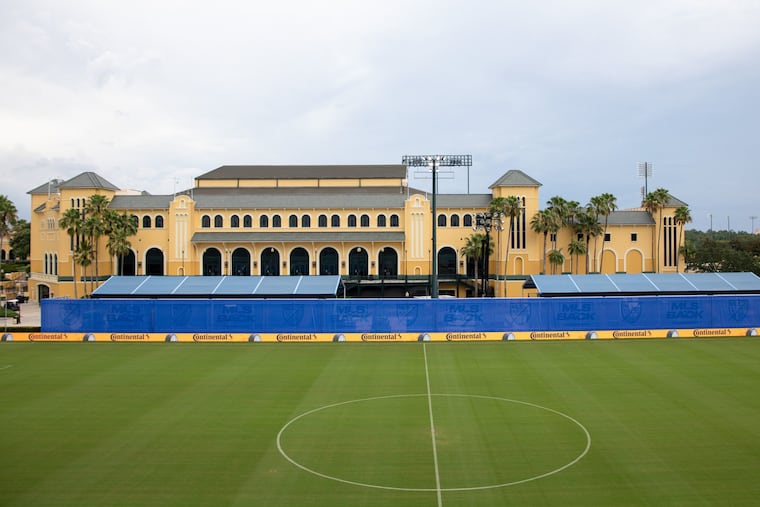ESPN is making a big bet on Major League Soccer by producing its Orlando tournament broadcasts
When MLS’s summer tournament kicks off Wednesday night, viewers of the prime-time opening game on ESPN will see a broadcast unlike any other you’ll find in soccer.

When Major League Soccer’s summer tournament kicks off Wednesday night, viewers of the prime-time opening game on ESPN will see a broadcast unlike any other you’ll find in soccer. Indeed, it will be unlike any other sports broadcast you’ll find, even during the coronavirus pandemic.
Not only will there not be fans in attendance, there won’t even be stands. The fields at Disney’s ESPN Wide World of Sports Complex near Orlando where the games will be played only have a few small covered bleachers, and they’ll be blocked by a screen.
This is both a challenge and an opportunity for Amy Rosenfeld, ESPN’s senior vice president of production who is overseeing the network’s coverage of the tournament. In addition to televising 36 of the tournament’s 54 games, ESPN is producing the host broadcast feed that will be the basis for broadcasts on Fox, FS1, Spanish-language TUDN (owned by Univision), Canada’s TSN and other networks worldwide.
So while, for example, each of the Union’s three group-stage games will be on a different channel, ESPN’s production crew will be behind the scenes for them all. The Union’s first game is Thursday against New York City FC (9 a.m., ESPN and ESPN Deportes).
If anyone’s up to the task, it’s Rosenfeld, whose 21-year soccer broadcasting career started by producing the 1999 Women’s World Cup.
“This is a massive commitment under very tough circumstances,” said Rosenfeld, who will be in the TV compound in Orlando. “I think that really reinforced to me ESPN’s commitment to soccer, ESPN’s commitment to MLS ... I’ve done big shows with ESPN. This is a big show.”
Unique touches in the broadcast will include a camera in a drone flying low over the field. There will be a range of virtual elements, including advertising superimposed on the sideline screen.
“We’ve had to build a significant amount of infrastructure here on site to make the most authentic-feeling venue setting that we possibly could,” said Seth Bacon, MLS’s senior vice president of media. “That involves making sure that we have places for signage, whether virtual or physical, [and] that we have the audio plan and the camera platforms built in the places that we need them. There has been a tremendous amount of work done so that when you see things on TV, whether they’re physical or virtual, they appear authentic, they appear real, and it’s things that don’t become too obtrusive through the game broadcast.”
The drone camera will be part of a fleet of cameras that Rosenfeld said is “more than double what we would typically use on an MLS regular-season game.” There will also be super-slow-motion cameras on poles behind the nets, and cameras embedded in the goalposts — a technology ESPN has pioneered.
There will not be artificial crowd noise on the broadcast, Bacon said, for a variety of reasons. One of the most prominent is input the league sought and received from fan groups.
“They wanted to make sure that we didn’t create this inauthentic experience,” Bacon said
No one will wear a microphone, Rosenfeld said, for health and sanitation reasons. Field-level audio will be captured by a wide range of field-level microphones, including small mics planted in the ground.
“You will be hearing everything,” Rosenfeld said, though it will come on a delay to account for expletives. “I think that there could be some content there that’s really instructional, impactful, educational.”
Rosenfeld said ESPN’s crew on site will be around 160 people. The Los Angeles Times reported that the production costs will total around $10 million.
“I’m really proud of all the broadcast partners, because everyone could have shied away from this and everyone could have cried poor, and we’re not,” Rosenfeld said. “This is a commitment to soccer in this country.”
For health reasons, no on-air broadcasters will be on site, except for ESPN and TUDN reporters who will be on the sideline during games. They are in the tournament bubble for the duration.
There are some questions about what Fox’s broadcasts will look like, since the network recently laid off its top soccer producer, Shaw Brown, as a cost-cutting measure. FS1 will carry 15 games, and Fox’s broadcast network will air the June 11 Atlanta United-New York Red Bulls game in prime time.
There’s also the biggest question of all: What if, as is expected, more games get postponed — or another team follows FC Dallas in being withdrawn from the tournament due to a virus outbreak?
Rosenfeld said ESPN will be ready.
“We will be very flexible, because we want MLS,” she said. “MLS needed to be back in a big way. People are starved for sports ... and we really wanted to deliver the beautiful game in a big, big way.”